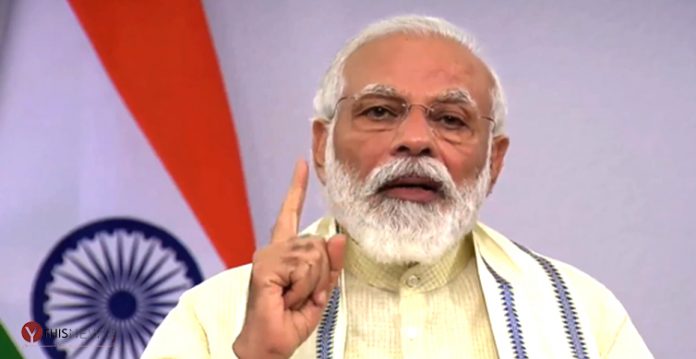A day after a US-based think tank, ‘Freedom House’ said in its report that India has downgraded to a “partly free” country, the government called today called it “misleading, incorrect and misplaced”, expressing its sharp criticism and contradiction of the research-based report.
The Centre formulated a point-wise reply where it stated that the annual ranking of India was wrong and it was evident as “many states in India are ruled by parties other than the one at the national level, through an election process which is free and fair and which is conducted by an independent election body.”
“This reflects the working of a vibrant democracy, which gives space to those who hold varying views,” the statement said.
The list of events that contributed to the downfall in 2020 included religious riots and “mob violence against Muslims” in Delhi, sedition laws used against government critics, and the problems faced by the migrants across the country when PM Modi suddenly declared a lockdown last year in what he said was an attempt to control the spread of covid-19.
ALSO READ:-India loses its free country status, listed as “Partly Free” by US research firm
Along with India, there are 72 other nations in the report that downgraded due to the political rights and civil liberties decreased there, leading to the effect touching three quarters of the global population. The Washington-based organization stated in its report that takes 210 countries into account that this year’s report is the worst since 2006 as the highest number of countries now have been labelled as “Not Free”. Joining India were democracies like the US too while authoritarian nations like Belarus, Venezuela and China also formed a part of the list.
The Centre responded further saying, “The Government of India treats all its citizens with equality as enshrined under the constitution of the country and all laws are applied without discrimination. Due process of law is followed in matters relating to law and order, irrespective of the identity of the alleged instigator.”
“With specific reference to the North East Delhi riots in January 2019, the law enforcement machinery acted swiftly in an impartial and fair manner. Proportionate and appropriate actions were taken to control the situation. Necessary legal and preventive actions were taken by the law enforcement machinery on all complaints/calls received, as per law and procedures.”
The government said “public order” and “police” were the state’s responsibilities as they investigate crimes and maintain law and order in their respective regions. “Therefore, measures as deemed fit are taken by law enforcement authorities to preserve public order,” it said while speaking about the use of sedition laws against journalists and government critics.
The phrase stating the “ham-fist” decision taken by PM Modi was also retaliated to as the Centre said that if any lockdown wasn’t announced, mass travel of people would have led to the faster spread of the disease. As such, it said, “Taking into consideration these facts, the global experience and need for consistency in the approach and implementation of various containment measures across the country, a nationwide lockdown was announced.”
The Centre further listed the things it did to control the pandemic and to help people get relieved of the problems they faced with the arrival of the disease. It claimed that India had witnessed “one of the lowest rates of active Covid cases and deaths globally.”
On the “Intimidation of academics and journalists and crackdown on expressions of dissent by media” pointer in the report of the Washington-based organization, the government replied that the freedom of expression is valid under the Indian Constitution’s Article 19.
“Discussion, debate and dissent is part of Indian democracy. The Government of India attaches highest importance to the safety and security of all residents of the country, including journalists. The Government of India has issued a special advisory to States and Union Territories on safety of journalists requesting them to strictly enforce the law to ensure safety and security of media persons.”
Decisions like the shutdown of internet were made with the “over-arching objective of maintaining law and order under strict safeguards,” the Centre defended itself while also speaking on the Amnesty International front. It claimed that the association’s 4 departments that were India registered were receiving a lot of money while wrongly calling it a Foreign Direct Investment (FDI).
The report that took 210 countries into consideration for forming its report said that less than 20% people now live in a “free country”.
“The changes in India since Modi took charge in 2014 form part of a broader shift in the international balance between democracy and authoritarianism, with authoritarians generally enjoying impunity for their abuses and seizing new opportunities to consolidate power or crush dissent,” the report said


